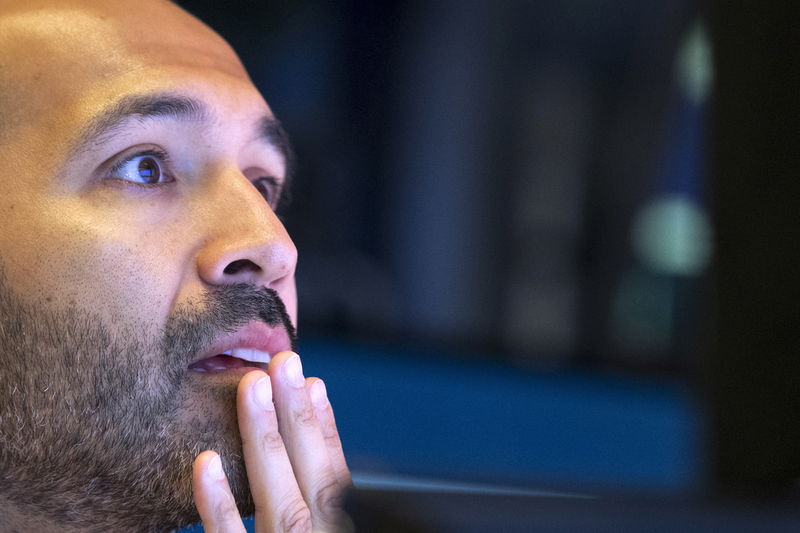* Global stocks fall as Trump threatens new tariffs
* Argentina's peso in freefall despite surprise rate hike
* Peso, Turkish lira down over 25 pct in Aug; real 10 pct
* European shares seen falling 0.2 pct
By Hideyuki Sano
TOKYO, Aug 31 (Reuters) - Asian shares came under renewed pressure on Friday as a report U.S. President Donald Trump was preparing to step up a trade war with Beijing sent Chinese stocks lower and partially erased gains made in this week's global rally.
Many emerging market currencies were also frail after Argentina's peso sank on Thursday despite the central bank's interest rate hike. shares are expected to open lower, with major European stock index futures STXEc1 FFIc1 FCEc1 FDXc1 falling 0.2 percent in early trade.
MSCI's broadest index of Asia-Pacific shares outside Japan .MIAPJ0000PUS dropped 0.7 percent, for monthly drop of 1.5 percent.
The index has underperformed MSCI ACWI .MIWD00000PUS , a gauge of the world's 47 markets, for four months in a row as Sino-U.S. trade worries hit Chinese shares.
The Shanghai composite index .SSEC had fallen to near a 2-year low hit earlier in the month but recovered some of the day's losses later in the session.
"China's stock market has priced in a very bad situation as if the Chinese economy was going into a hard landing, which I don't think will be the case," said Chi Lo, an economist at BNP Paribas (PA:BNPP) Asset Management.
While trade jitters dominated market sentiment, indicators suggests activity in the world's second largest economy remained firm.
The official Purchasing Managers' Index (PMI) on Friday showed growth in China's manufacturing sector unexpectedly picked up in August after a two-month slide.
Still, investors remained cautious as they expect more risks from the trade frictions down the road. Nikkei .N225 closed down 0.02 percent.
U.S. S&P500 e-mini futures ESc1 were slightly weaker a day after the S&P 500 .SPX lost 0.44 percent from Wednesday's record close of 2,914.
Pouring cold water on a rally in global shares that started in the middle of the month were hostile comments from Trump on trade.
Bloomberg reported that Trump said he was ready to impose more tariffs on $200 billion worth of goods from China as soon as the public comment period on the plan ends next week. far, Trump has carried out what he said he would do," said Ayako Sera, market economist at Sumitomo Mitsui Trust Bank. "Even though there are some doubts the U.S. trade representative could come up with new tariffs so quickly, I suspect worries about a trade war will start to eclipse optimism based on strong U.S. economic data."
Trump also threatened in an interview with Bloomberg on Thursday to withdraw from the World Trade Organization if "they don't shape up" -- a move that would further undermine one of the foundations of the modern global trading system. addition, he said the European Union's proposal to eliminate auto tariffs is not good enough and called its trade policies "almost as bad as China." remarks hosed down any positive sentiment following negotiations over the North American Free Trade Agreement (NAFTA).
The cautious mood helped lift the yen, which rose 0.6 percent on Thursday, its biggest daily rise in about six weeks. In Asian Friday trade, it stood flat at 110.98 per dollar JPY= .
The euro was little changed at $1.1665 EUR= , having shed 0.33 percent in the previous session.
The common currency has recovered from a 13-1/2-month low of $1.1301 hit in mid-August but looks set to end the month little changed from end-July.
Emerging market currencies had less luck, with currencies relying on foreign capital to finance their current account deficit hit the hardest.
The peso ARS=RASL , the world's worst-performing currency this year due to the country's poor economic health, fell 10 percent on the day, bringing its month-to-date losses to 27 percent.
Argentina's central bank at an emergency meeting on Thursday voted unanimously to raise its benchmark rate to 60 percent from 45 percent, however, the unexpected move failed to stabilise the peso.
That knocked the Brazilian real BRL= to near its record low touched in September 2015. It is down almost 10 percent this month.
The Turkish lira, which has been hit by concerns over President Tayyip Erdogan's interference in monetary policy and his diplomatic spats with Washington, also slipped towards record low marked about two weeks ago.
The lira TRYTOM=D3 bounced back more than 2 percent to 6.4992 per dollar in volatile trade, though it has fallen 9 percent so far this week. It was hit lately by reports central bank deputy governor was leaving the bank. Asia, the Indonesian rupiah IDR= fell to three-year low even as the country's central bank said it was "decisively" intervening to support the currency. The rupiah has lost two percent so far this month.
The Indian rupee INR=D2 hit a record low, having fallen 3.4 percent so far this month.
Oil prices steadied after hitting their highest levels in more than a month the previous day on growing evidence of disruptions to crude supply from Iran and Venezuela and after a fall in U.S. inventories.
Brent crude oil LCOc1 traded almost flat at $77.70 a barrel while U.S. crude CLc1 stood at $70.26 a barrel, little changed from previous close.
<^^^^^^^^^^^^^^^^^^^^^^^^^^^^^^^^^^^^^^^^^^^^^^^^^^^^^^^^^^^ MSCI, Nikkei datastream chart
http://reut.rs/2sSBRiD Asian shares vs world shares
https://reut.rs/2LMCHpu World FX rates in 2018
http://tmsnrt.rs/2egbfVh
^^^^^^^^^^^^^^^^^^^^^^^^^^^^^^^^^^^^^^^^^^^^^^^^^^^^^^^^^^^> (Editing by Sam Holmes)
